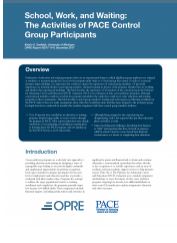 This brief summarizes findings from in-depth interviews with 39 members of the control group in the Pathways for Advancing Careers and Education (PACE) study. PACE is a rigorous evaluation of nine career pathways programs. PACE used an experimental design in which eligible program applicants were randomly assigned to a treatment group that could access the program under study or a control group that could not. In order to accurately interpret impact findings, it is important that evaluators understand the experiences of control group members.
This brief summarizes findings from in-depth interviews with 39 members of the control group in the Pathways for Advancing Careers and Education (PACE) study. PACE is a rigorous evaluation of nine career pathways programs. PACE used an experimental design in which eligible program applicants were randomly assigned to a treatment group that could access the program under study or a control group that could not. In order to accurately interpret impact findings, it is important that evaluators understand the experiences of control group members.
PACE was initiated in 2007 by the Office of Administration for Children & Families at the U.S. Department of Health & Human Services. Abt Global conducted this 10-year random assignment study looking at innovative career pathways systems that provide articulated educational steps, instructional and personal supports, and connections to employment.



